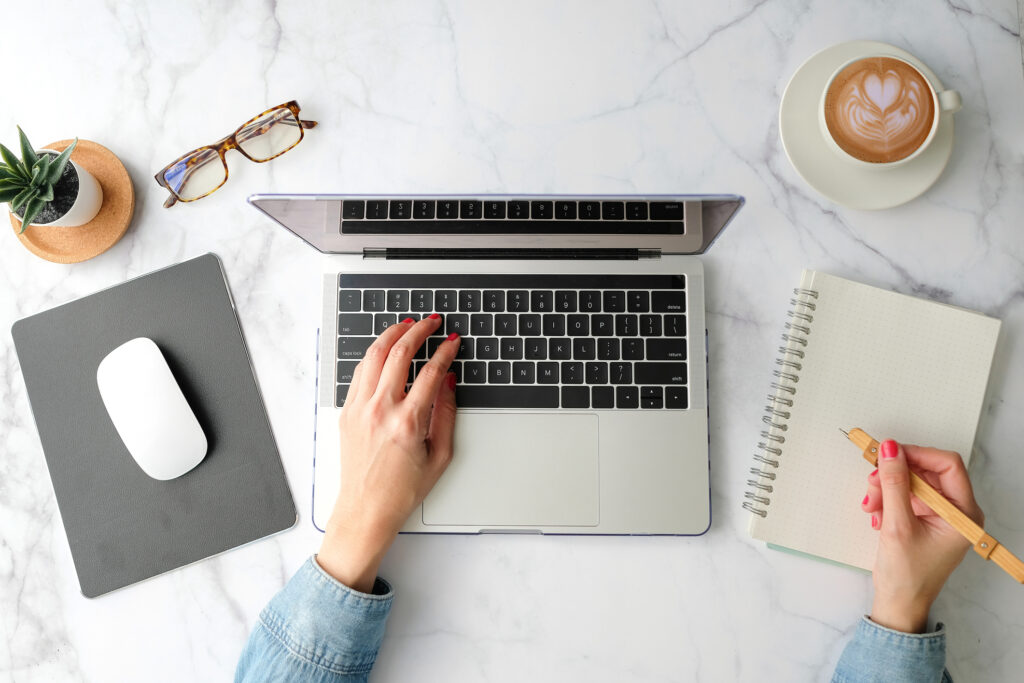A clear desk mirrors a clear mind, ready to tackle the day’s challenges.

“Clutter is nothing more than postponed decisions.” – Barbara Hemphill
Something that I noticed in childhood but didn’t master until adulthood is that my environment really shapes my energy. I used to keep a really messy desk because desk decluttering felt a little overwhelming—the clutter would creep in and it became just part of the background until it felt so messy I wasn’t sure where to begin. As an adult, I’ve realized that I can declutter my desk in as little as 5-15 minutes and it makes a huge impact on how I operate, so I do this regularly now. Today’s a great day to focus on this truth, so let’s go!
Studies show that a clean and organized environment (including a decluttered desk) can significantly enhance focus and processing capabilities. While cleaning your desk may not feel like the most important or fun activity, it’s a fantastic use of 15 or so minutes of your time. Here are some research studies I found interesting and think prove the point, along with some ways to put these findings into action:
- Environmental Order and Mental Order: Vohs et al. (2013) found that orderly environments lead to better decision-making and productivity. Action: Regularly organize your desk to maintain a conducive work environment.
- Clutter and Stress: A study by Saxbe and Repetti (2010) shows that cluttered spaces can increase stress. Action: Remove unnecessary items from your desk to reduce stress.
- Space Management and Creativity: McElroy and Morrow (2010) suggest that well-organized spaces can boost creativity. Action: Arrange your desk to inspire and facilitate creative thinking.
- The Psychology of Cleaning: A study by Roster (2016) indicates that cleaning can provide a sense of control and accomplishment. Action: Make desk cleaning a regular habit for emotional well-being.
- Efficiency and Organization: Researchers at Princeton University (2011) found that clutter can distract from tasks at hand. Action: Keep only essential items on your desk to enhance efficiency.
If you, like my childhood self, don’t know exactly where to start, here are a few more quick actions you can take to declutter your desk and keep it uncluttered. I challenge you to incorporate one or more of these into your routine:
- Start with a Clear Out: Remove everything from your desk to start fresh.
- Categorize Your Items: Sort items into ‘keep’, ‘discard’, or ‘store’ categories.
- Optimize Desk Layout: Arrange frequently used items within easy reach.
- Use Organizers: Invest in desk organizers for pens, papers, and other supplies.
- Go Digital: Minimize paper clutter by digitizing documents when possible.
- Label and File: Label files clearly for easy access and retrieval.
- Regular Cleaning Schedule: Set a specific time each week for desk maintenance.
- Personal Touch: Add a plant or photo for a touch of personal comfort.
- Cable Management: Use cable organizers to keep cords neat and out of the way.
- End-of-Day Routine: Spend a few minutes at the end of each day to tidy up.
If you’d like more support in organizing your life in a way that decreases friction and stress and increases productivity and creativity, download my app, subscribe to my newsletter, or contact me to book a free coaching call!
